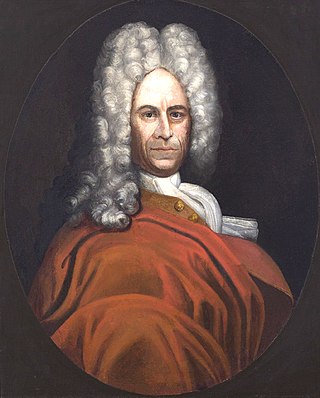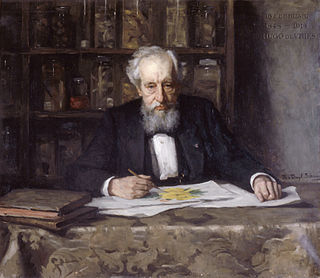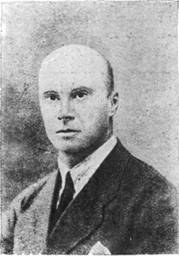Related Research Articles
Calculus is the mathematical study of continuous change, in the same way that geometry is the study of shape, and algebra is the study of generalizations of arithmetic operations.

Gottfried Wilhelm (von) Leibniz was a German polymath active as a mathematician, philosopher, scientist and diplomat. Leibniz is also called "The Last Universal Genius" due to his knowledge and skills in different fields and because such people became less common during the Industrial Revolution and spread of specialized labor after his lifetime. He is a prominent figure in both the history of philosophy and the history of mathematics. He wrote works on philosophy, theology, ethics, politics, law, history, philology, games, music, and other studies. Leibniz also made major contributions to physics and technology, and anticipated notions that surfaced much later in probability theory, biology, medicine, geology, psychology, linguistics and computer science. In addition, he contributed to the field of library science by devising a cataloguing system whilst working at Wolfenbüttel library in Germany that would have served as a guide for many of Europe's largest libraries. Leibniz's contributions to a wide range of subjects were scattered in various learned journals, in tens of thousands of letters and in unpublished manuscripts. He wrote in several languages, primarily in Latin, French and occasionally in German.

The history of calculus is fraught with philosophical debates about the meaning and logical validity of fluxions or infinitesimal numbers. The standard way to resolve these debates is to define the operations of calculus using epsilon–delta procedures rather than infinitesimals. Nonstandard analysis instead reformulates the calculus using a logically rigorous notion of infinitesimal numbers.

In evolutionary biology, punctuated equilibrium is a theory that proposes that once a species appears in the fossil record, the population will become stable, showing little evolutionary change for most of its geological history. This state of little or no morphological change is called stasis. When significant evolutionary change occurs, the theory proposes that it is generally restricted to rare and geologically rapid events of branching speciation called cladogenesis. Cladogenesis is the process by which a species splits into two distinct species, rather than one species gradually transforming into another.
In physics and chemistry, the law of conservation of energy states that the total energy of an isolated system remains constant; it is said to be conserved over time. In the case of a closed system the principle says that the total amount of energy within the system can only be changed through energy entering or leaving the system. Energy can neither be created nor destroyed; rather, it can only be transformed or transferred from one form to another. For instance, chemical energy is converted to kinetic energy when a stick of dynamite explodes. If one adds up all forms of energy that were released in the explosion, such as the kinetic energy and potential energy of the pieces, as well as heat and sound, one will get the exact decrease of chemical energy in the combustion of the dynamite.

Christian Wolff was a German philosopher. Wolff is characterized as one of the most eminent German philosophers between Leibniz and Kant. His life work spanned almost every scholarly subject of his time, displayed and unfolded according to his demonstrative-deductive, mathematical method, which perhaps represents the peak of Enlightenment rationality in Germany.
The stationary-action principle – also known as the principle of least action – is a variational principle that, when applied to the action of a mechanical system, yields the equations of motion for that system. The principle states that the trajectories are stationary points of the system's action functional. The term "least action" is a historical misnomer because the principle has no general minimality requirement.
Digital physics is a speculative idea that the universe can be conceived of as a vast, digital computation device, or as the output of a deterministic or probabilistic computer program. The hypothesis that the universe is a digital computer was proposed by Konrad Zuse in his 1969 book Rechnender Raum. The term digital physics was coined by Edward Fredkin in 1978, who later came to prefer the term digital philosophy. Fredkin encouraged the creation of a digital physics group at what was then MIT's Laboratory for Computer Science, with Tommaso Toffoli and Norman Margolus as primary figures.
The classical limit or correspondence limit is the ability of a physical theory to approximate or "recover" classical mechanics when considered over special values of its parameters. The classical limit is used with physical theories that predict non-classical behavior.
In mathematics, nonstandard calculus is the modern application of infinitesimals, in the sense of nonstandard analysis, to infinitesimal calculus. It provides a rigorous justification for some arguments in calculus that were previously considered merely heuristic.

Mutationism is one of several alternatives to evolution by natural selection that have existed both before and after the publication of Charles Darwin's 1859 book On the Origin of Species. In the theory, mutation was the source of novelty, creating new forms and new species, potentially instantaneously, in sudden jumps. This was envisaged as driving evolution, which was thought to be limited by the supply of mutations.
Continuity or continuous may refer to:
Non-Aristotelian drama, or the 'epic form' of the drama, is a kind of play whose dramaturgical structure departs from the features of classical tragedy in favour of the features of the epic, as defined in each case by the ancient Greek philosopher Aristotle in his Poetics
Continuum theories or models explain variation as involving gradual quantitative transitions without abrupt changes or discontinuities. In contrast, categorical theories or models explain variation using qualitatively different states.
Saltus may refer to:
In mathematical dynamics, discrete time and continuous time are two alternative frameworks within which variables that evolve over time are modeled.
In philosophy, Weyl's tile argument, introduced by Hermann Weyl in 1949, is an argument against the notion that physical space is "discrete", as if composed of a number of finite sized units or tiles. The argument purports to show a distance function approximating Pythagoras' theorem on a discrete space cannot be defined and, since the Pythagorean theorem has been confirmed to be approximately true in nature, physical space is not discrete. Academic debate on the topic continues, with counterarguments proposed in the literature.

Boris Mikhailovich Kozo-Polyansky was a Soviet and Russian botanist and evolutionary biologist, best known for his seminal work, Symbiogenesis: A New Principle of Evolution, which was the first work to place the theory of symbiogenesis into a Darwinian evolutionary context, as well as one of the first to redefine cell theory.
In logic, an infinite-valued logic is a many-valued logic in which truth values comprise a continuous range. Traditionally, in Aristotle's logic, logic other than bivalent logic was abnormal, as the law of the excluded middle precluded more than two possible values for any proposition. Modern three-valued logic allows for an additional possible truth value and is an example of finite-valued logic in which truth values are discrete, rather than continuous. Infinite-valued logic comprises continuous fuzzy logic, though fuzzy logic in some of its forms can further encompass finite-valued logic. For example, finite-valued logic can be applied in Boolean-valued modeling, description logics, and defuzzification of fuzzy logic.
References
- ↑ Stanford Encyclopedia of Philosophy: "Continuity and Infinitesimals".
- 1 2 Alexander Baumgarten, Metaphysics: A Critical Translation with Kant's Elucidations, Translated and Edited by Courtney D. Fugate and John Hymers, Bloomsbury, 2013, "Preface of the Third Edition (1750)", p. 79 n. d: "[Baumgarten] must also have in mind Leibniz's "natura non facit saltus [nature does not make leaps]" (NE IV, 16)." Also see Gottfried Wilhelm Leibniz, Nouveaux essais sur l'entendement humain , 1704, p. 50
- ↑ Charles Darwin, Origin of Species , 1859, p. 194; see p. 173 in the 1860 US edition, at this link
- ↑ Carolus Linnaeus, Philosophia Botanica, 1st ed., 1751, Chapter III, § 77, p. 27.
- ↑ Marxists.org and Arizona.edu Archived 2007-03-14 at the Wayback Machine
- ↑ Stevens, Peter F. (1994). The Development of Biological Systematics: Antoine-Laurent de Jussieu, Nature, and the Natural System. New York: Columbia University Press. p. 7. ISBN 0-231-06440-3.
- 1 2 Texlog.de
- ↑ Ray, John (1682). Methodus plantarum nova. London: Henry Faithorne & John Kersey. p. praef.
- ↑ Britton, Andrew; Sedgwick, Peter H.; Bock, Burghard (2008). Ökonomische Theorie und christlicher Glaube. LIT Verlag Münster. p. 289. ISBN 978-3-8258-0162-5. Extract of page 289.
- ↑ Fishburn, Geoffrey (2004). "Natura non facit saltum in Alfred Marshall (and Charles Darwin)". History of Economics Review. 40 (1): 59–68. doi:10.1080/18386318.2004.11681190. S2CID 54814546 . Retrieved 2021-10-06.